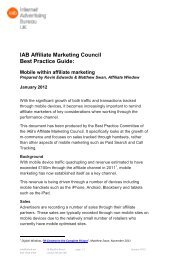Download full version - IAB UK
Download full version - IAB UK
Download full version - IAB UK
Create successful ePaper yourself
Turn your PDF publications into a flip-book with our unique Google optimized e-Paper software.
1.<br />
Discrepancy<br />
Buster
Preventing discrepancy checklist<br />
Discrepancies, the difference between<br />
numbers reported by a publisher and a<br />
third party ad server, are a big source<br />
of frustration for both agencies and<br />
publishers.<br />
There will always be some degree of<br />
discrepancy between the publisher and<br />
the 3 rd party ad server because of the<br />
differences in technology and the<br />
different points at which they count.<br />
However, there are a number of simple<br />
checks both publisher and agency<br />
teams can do before running a campaign to help reduce and even prevent the<br />
majority of discrepancies. These include:<br />
i. Trafficking errors<br />
ii.<br />
iii.<br />
iv.<br />
Heavy creative<br />
Page download<br />
Redirecting ad calls<br />
v. Browser issues<br />
vi.<br />
iFrames<br />
Discrepancy tolerance<br />
The <strong>IAB</strong> recommends a tolerance of 10% for discrepancy<br />
based on the publisher’s figures.<br />
While discrepancy can be the cause of under or over delivery, it<br />
is actually a different issue. The Institute of Practitioners in<br />
Advertising (IPA) currently recommends a tolerance of 5% for<br />
under and over delivery, this shouldn’t be confused with<br />
discrepancy.<br />
2
i) Trafficking errors<br />
With the trafficking of tags being a manual process there is always the possibility<br />
of human error. When implementing tags watch out for some common errors<br />
including:<br />
Failing to copy and paste the entire 3 rd party tag.<br />
Not implementing the correct cachebuster or timestamp.<br />
Using incorrect 3 rd party tag (JavaScript vs. i-frame in accordance with ad<br />
calls on the page).<br />
Difference between campaign run dates from 3 rd party to publisher.<br />
All of these errors can increase the chance of having higher discrepancy for<br />
impressions or clicks.<br />
Make sure your traffic teams have regular training regarding cachebuster<br />
implementation for the tracking of new and existing tags will mean that this<br />
can be minimised.<br />
ii) Heavy creative<br />
With the increase in use of rich media creative, file sizes are extremely important<br />
as heavy creative can increase discrepancies due to increased load times for the<br />
ads and the website.<br />
This in turn has an effect on the user’s experience. It is important to have<br />
standard file sizes for each ad format which is served. Complying with the <strong>IAB</strong><br />
best practises can ensure that the ads are served correctly. E.g. Having the<br />
initial load at 40kb and then polite downloading the rest of the elements of the ad<br />
up to a maximum of 2mb.<br />
Using reputable rich media vendors that do all the checks on the client side<br />
e.g. bandwidth, sniffer code etc will help to reduce discrepancy. This can<br />
enable the publisher to target relevant ads based on the user connection, for<br />
instance a smaller file creative to older browsers or users connecting via dial-up.<br />
iii) Page download<br />
The way in which a website has been built and how content heavy the website is,<br />
can affect the amount of time it takes for an ad to appear.<br />
The longer it takes for the website to load has a related effect on the ads<br />
download time. There can be variations to this because some sites are produced<br />
3
so that the ads are displayed first and the content is displayed second. The<br />
benefit of this is that the ads are downloaded to the page faster.<br />
Having a low page weight such as 300kb will mean that the page will<br />
download faster which will therefore help reduce discrepancies and also<br />
improve user experience.<br />
Heavy pages and high ad file sizes will directly affect discrepancy as this is just<br />
further increasing the time lag also known as latency.<br />
With all of these issues the main aim is to spot the problems early on in the<br />
campaign. Depending on the campaign length the trafficker should request<br />
regular reports from the 3 rd party server. By comparing the stats daily you will<br />
be able to spot a high discrepancy and then investigate what could be causing<br />
the problem.<br />
iv) Redirecting ad calls<br />
Redirecting Ad calls can be a cause for discrepancy because if these ad calls are<br />
being called using a 302 redirect (daisy chain)<br />
I. If there are characters inside the URL chain that the browser does not<br />
understand the URL might not be able to resolve to the correct location.<br />
Also the parsing code that is being used extract the data can break the<br />
chain so that no redirect can follow-through – to be able to correct this it is<br />
always a good to escape the URL so that the browser can understand<br />
characters that are not browser friendly and also the parsing code used by<br />
the 3 rd or 4 th party is able to process the strings correctly<br />
II. There is a limitation in Internet Explorer that limits any URL to 2083<br />
characters, by adding more and more URLS to a redirect chain may cause<br />
the URL to exceed this character limitation and there for break and<br />
redirecting will not be able to follow through.<br />
III.<br />
Timing: Because each URL in the chain gets fired one after the other in a<br />
chain, each URL gets parsed and then will continue on to the next URL<br />
and so on.<br />
If the user closes the browser window while this process is running, the<br />
redirecting will stop and not all parties will count.<br />
v) Browser issues<br />
Different browsers can be reason for discrepancies It is always important to<br />
make sure that ads are always tested on the browsers they are meant to run on<br />
and make sure they ads are displaying correctly.<br />
4
I. Most ads today are delivered and displayed on web pages using<br />
JavaScript, If the browser does not have support for JavaScript then there<br />
is a chance that the ad may not display the ad depending on the party<br />
serving the tag. Most vendors will always have an alternative ad to display<br />
in the event that JavaScript is disabled or if the browser cannot support it.<br />
This can be identified in the tag that is serving the ad as it will have a<br />
portion that will contain an simple image tag. If this<br />
is not included in the tag , this can account for discrepancy as 3 rd party ad<br />
server will not deliver any ad in this case.<br />
II.<br />
Code behaves differently in different browsers and in some cases can<br />
break the ad or even the publishers page from loading. For example, if<br />
there is an ad that has a code error in a certain browser, this can be<br />
caused by the ad code is conflicting with the publishers own code or the<br />
publisher maybe using some JavaScript libraries that are not compatible<br />
with the 3 rd party’s code. This can cause 3 rd party Tags to break and not<br />
load.<br />
III. There is a limitation in Internet Explorer that limits any URL to 2083<br />
characters, by adding more and more URLS to a redirect chain may cause<br />
the URL to exceed this character limitation and there for break and<br />
redirecting will not be able to follow through.<br />
iv) iFrames<br />
In some cases serving ads into I-frames require the publisher to use a stub file<br />
(code that will allow the ad to run outside the iframe) mainly rich ads and<br />
expanding formats.<br />
If this stub file is not correctly implemented it may cause the ad to break and not<br />
load at all, so it is important to make sure if an ad requires it to use a stub file that<br />
it is implemented correctly, every 3 rd party ad server will have instructions on how<br />
to correctly implement their stub file.<br />
5
















